How to Cope with the Emotional Impact of a Cancer Diagnosis
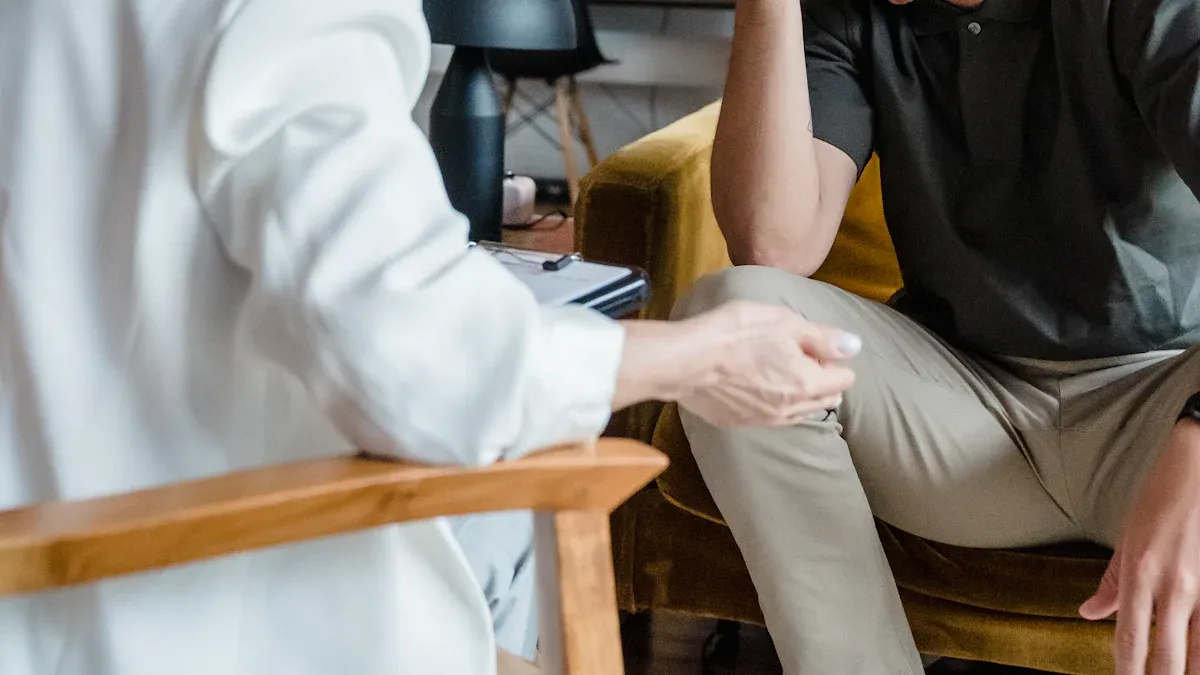
A cancer diagnosis can feel like a tidal wave. You might feel shock, fear, or even anger. These reactions are normal. In fact, more than half of people report feeling overwhelmed right away, especially younger patients and women.
Group | Percentage Reporting Shock or Emotional Overwhelm Immediately After Diagnosis |
|---|---|
Younger patients (<65) | 60% |
Older patients (≥65) | 50% |
Women | 56% |
Men | 42% |
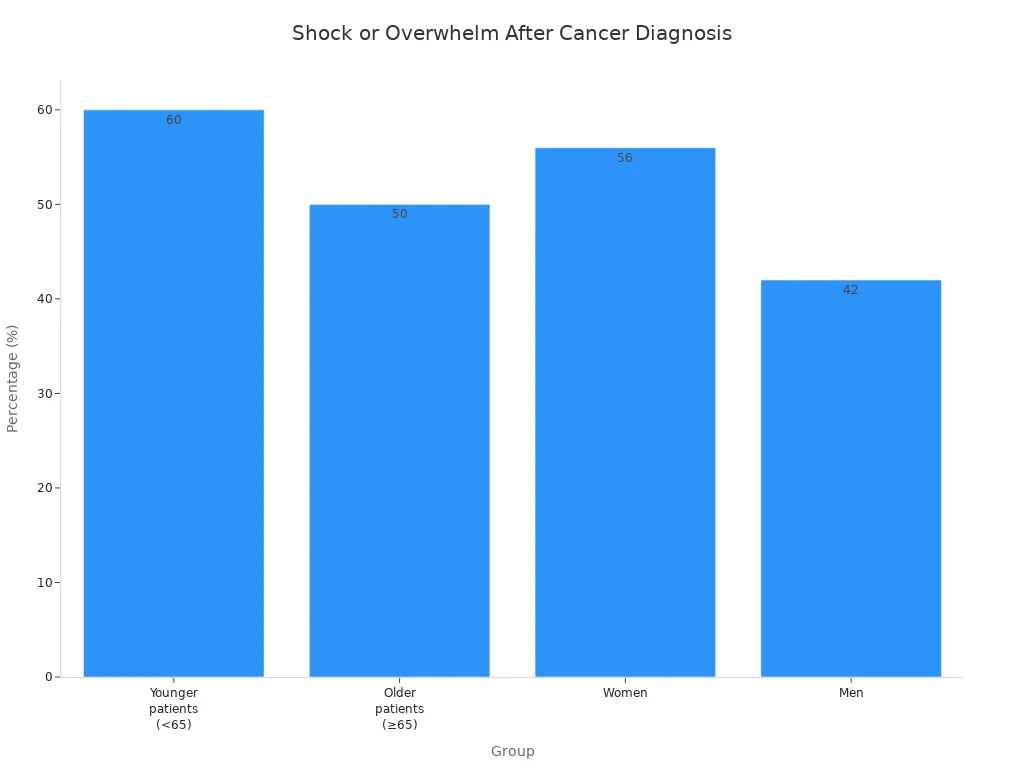
You may notice feelings like stress, sadness, or frustration. The Emotional Impact of a Cancer Diagnosis: Coping Mechanisms often starts with letting yourself feel these emotions. You are not alone.
Key Takeaways
Feeling shock, fear, or sadness after a cancer diagnosis is normal; accepting these emotions helps you heal.
Simple self-care actions like mindfulness, gentle exercise, and journaling can reduce stress and improve your mood.
Connecting with family, friends, or support groups provides comfort and helps you feel less alone.
Professional help from counselors or medical teams can offer valuable support and reduce emotional distress.
Caregivers also need self-care and support to stay strong and provide the best care for their loved ones.
Emotions
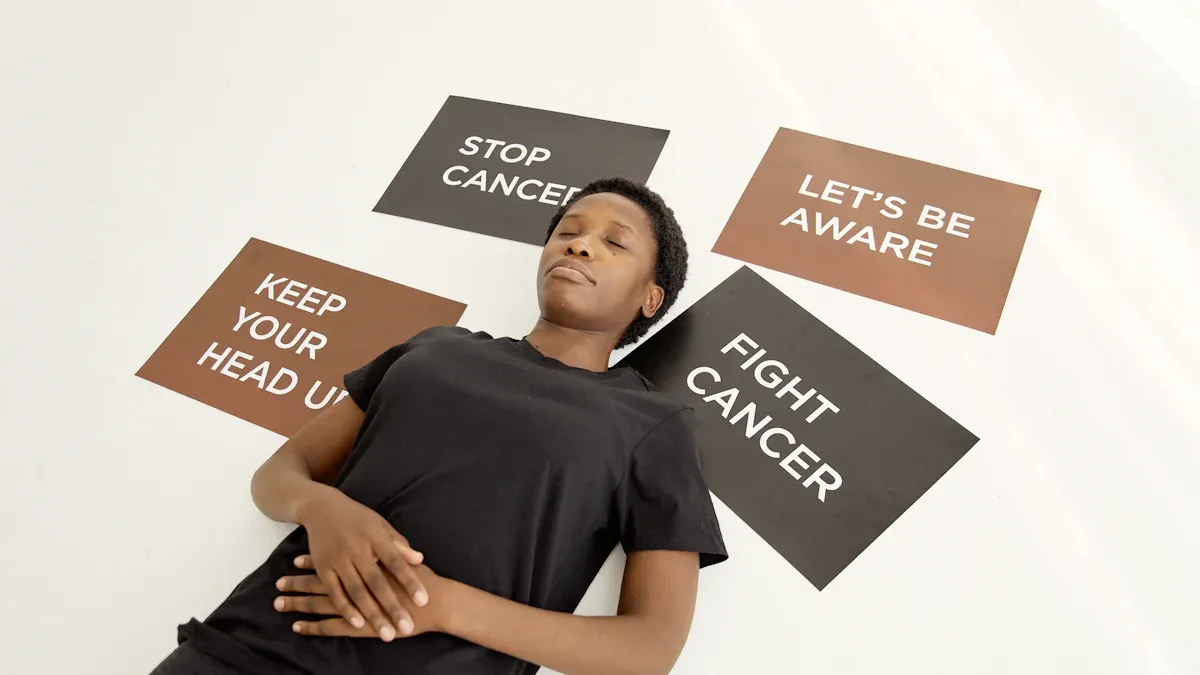
Common Reactions
When you first hear the word "cancer," your mind might race with all kinds of feelings. You are not alone. Many people experience a mix of emotions in the first few weeks after a diagnosis. Here are some of the most common reactions:
Shock or disbelief, feeling like this cannot be real
Anxiety about what will happen next
Hopelessness or sadness, especially when thinking about the future
Fear of the unknown, losing control, or even death
Worries about treatment costs and how life will change
Feeling vulnerable or struggling to accept the idea of being a "patient"
Concerns about work, money, or unfinished goals, which can feel stronger if you are younger
Social stigma or feeling different from others
Sometimes, people even have thoughts about giving up, especially if they do not have support
You might notice that fear and worry show up in different ways. Fear can make you want to avoid talking about cancer or seeing a doctor. Worry might feel lighter, but it still weighs on your mind. Sometimes, people use softer words for cancer because the topic feels heavy.
Note: Emotional distress is very common. About one in three cancer survivors worldwide feel depressed, and almost as many feel anxious. During tough times, like the COVID-19 pandemic, these numbers go even higher.
Emotional Distress Component | Global Prevalence Estimate |
|---|---|
Depression | 33% |
Anxiety | 31% |
Depression (COVID-19) | 43% |
Anxiety (COVID-19) | 53% |
Accepting Your Feelings
You might wonder, "Is it okay to feel this way?" The answer is yes. Accepting your feelings is a big step toward healing. Here are some ways you can start:
Give yourself time each day to relax. You do not need to avoid stress, but you can calm your body and mind.
Notice which things you can control and which you cannot. You get to decide how you tell your story.
Let yourself feel emotions instead of shutting them down. This can help lower anxiety and sadness.
Talk openly with people you trust, but remember you can set boundaries if a topic feels too hard.
Accept help from friends and family. Letting others help with meals or chores can make everyone feel better.
Try simple coping tools like deep breathing or gentle movement. Support groups and therapy can also help you share your feelings and feel less alone.
Remember, every culture has its own way of dealing with emotions. Some people feel pressure to hide their feelings to keep family peace, while others find it helpful to talk openly. No matter your background, your feelings matter. You deserve support and understanding as you move forward.
The Emotional Impact of a Cancer Diagnosis: Coping Mechanisms
When you first hear the words "You have cancer," your world can feel upside down. The Emotional Impact of a Cancer Diagnosis: Coping Mechanisms can seem overwhelming, but you have tools and support to help you through. Let’s look at some ways you can take care of yourself, connect with others, and get professional help when you need it.
Self-Care
Taking care of yourself is not selfish—it’s necessary. The Emotional Impact of a Cancer Diagnosis: Coping Mechanisms often starts with small, daily actions that help you feel more in control. Here are some self-care strategies that many people find helpful:
Mindfulness and Meditation: Even a few minutes of mindfulness each day can lower your stress and help you feel calmer. Mindfulness-based programs like MBSR (Mindfulness-Based Stress Reduction) and MBCT (Mindfulness-Based Cognitive Therapy) have helped many people with cancer feel less anxious and more hopeful.
Gentle Exercise: Activities like walking, yoga, or tai chi can boost your mood. Moving your body releases endorphins, which are natural chemicals that help you feel better.
Journaling: Writing down your thoughts and feelings can help you process what’s happening. Many people say journaling gives them mental clarity and a sense of relief.
Relaxation Techniques: Try deep breathing, guided imagery, or even self-hypnosis. These methods can help you relax and manage tough emotions.
Creative Activities: Drawing, painting, or listening to music can give you a break from worry and help you express yourself.
Tip: You don’t have to do everything at once. Pick one or two self-care ideas that feel right for you and start there.
Here’s a quick look at some self-care strategies and their benefits:
Self-Care Strategy | How It Helps |
|---|---|
Mindfulness/Meditation | Reduces anxiety, stress, and depression |
Gentle Exercise | Boosts mood, lowers anxiety, improves well-being |
Journaling | Helps process emotions, provides mental clarity |
Relaxation Techniques | Promotes calmness and emotional balance |
Creative Activities | Offers emotional release and distraction |
The Emotional Impact of a Cancer Diagnosis: Coping Mechanisms can feel less heavy when you treat yourself with kindness. Remember, it’s okay to rest and take breaks. You deserve care and compassion, especially now.
Support Networks
You don’t have to face this alone. The Emotional Impact of a Cancer Diagnosis: Coping Mechanisms often involves reaching out to others. Family, friends, and support groups can make a huge difference.
Research shows that most people with cancer rely on family and friends for emotional support. These connections help you cope with shock, anger, and sadness. When you talk to someone you trust, you may feel less alone and more understood.
Support groups offer a special kind of help. In these groups, you can share your story, listen to others, and learn new ways to cope. Here are some benefits of joining a support group:
You feel less lonely and isolated.
You can talk about your fears and frustrations in a safe space.
You hear stories of hope and resilience.
You get practical advice for daily challenges and treatment side effects.
You choose how much you want to share or just listen.
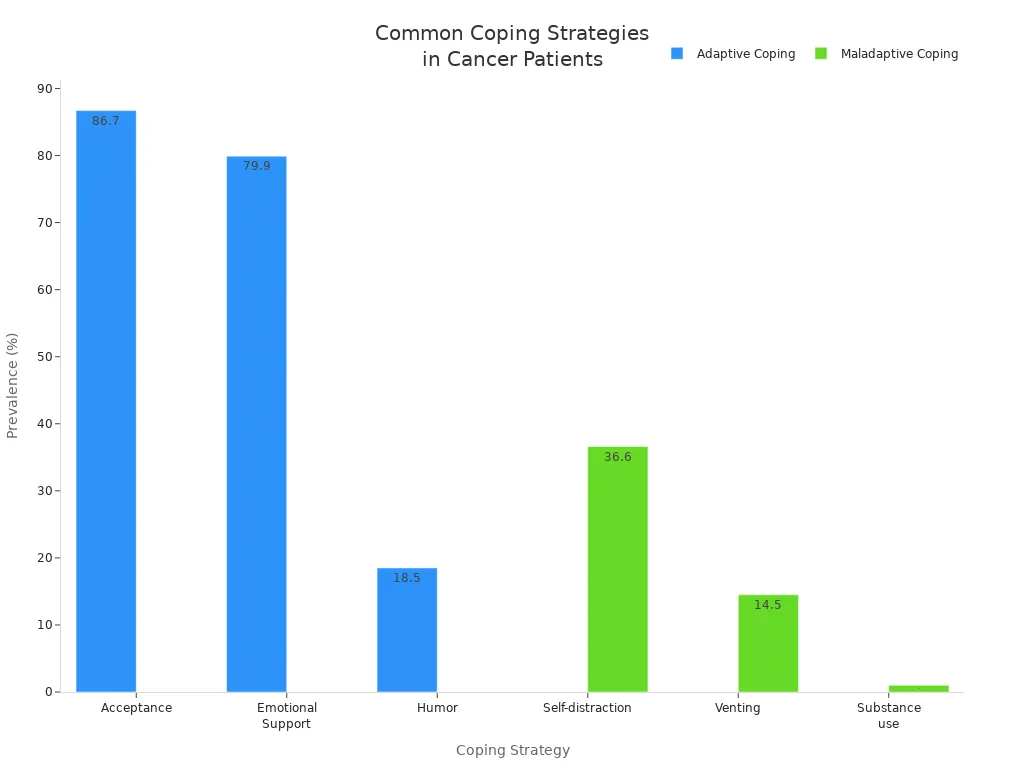
The Emotional Impact of a Cancer Diagnosis: Coping Mechanisms can change over time. At first, you might feel more distress and use less helpful coping strategies, like denial or self-blame. As you move forward, you may find it easier to accept help, use positive thinking, or focus on what matters most to you. Support networks help you make this shift.
Note: People with strong social support often have better mental health, higher quality of life, and even live longer.
Professional Help
Sometimes, you need more than self-care and support from loved ones. The Emotional Impact of a Cancer Diagnosis: Coping Mechanisms can include getting help from professionals. Therapists, counselors, and your medical team know how to support you through tough times.
Here are some ways professional help can make a difference:
Counseling and Therapy: Talking to a mental health professional gives you a safe space to share your feelings. Therapists use tools like Cognitive Behavioral Therapy (CBT), mindfulness, and creative therapies to help you cope.
Support from Your Medical Team: Doctors, nurses, and social workers can answer your questions and connect you with resources.
Specialized Organizations: Groups like the American Cancer Society, CancerCare, and Gilda’s Club offer free counseling, support groups, and educational materials.
Intervention Type | Target Outcome | Key Findings |
|---|---|---|
Coping and Communication-Enhancing Intervention (CCI) | Depressive symptoms | Reduced depressive symptoms compared to usual care; focused on managing disease-specific stressors |
Supportive Counseling (SC) | Depressive symptoms | Also reduced depressive symptoms; stronger effects in subgroups with higher emotional expressivity and physical disability |
Usual Care (UC) | Depressive symptoms | No significant reduction compared to interventions |
You might feel nervous about asking for help, but many people find that counseling or therapy makes a real difference. Even brief therapy sessions can lower distress and help you find new ways to cope.
Callout: If you ever feel overwhelmed, reach out to a professional. You are not alone, and help is available.
The Emotional Impact of a Cancer Diagnosis: Coping Mechanisms will look different for everyone. You might use self-care, lean on your support network, or talk to a counselor—or all three. What matters most is finding what works for you and remembering that hope and healing are possible.
Communication
Talking to Loved Ones
Telling your loved ones about your cancer diagnosis can feel scary. You might worry about their reactions or how much to share. Open conversations help everyone feel more supported and less alone. When you talk honestly, you give your family a chance to help you and each other.
Here are some tips to guide you:
Pick the right time and place. Choose a moment when you feel calm and ready.
Use clear, honest words. Speak in a way that matches the age and understanding of your listener, especially with children.
Share only what you feel comfortable sharing. You decide what details to give and to whom.
Ask someone you trust to update others. This can take some pressure off you.
Let your loved ones know how they can help. Be specific if you need meals, rides, or just someone to listen.
Allow space for emotions. It’s okay if people feel sad, worried, or even angry.
Keep the conversation open. Invite questions and talk about everyday things, too.
Research shows that open and honest talks with family can lower stress and help everyone cope better. Families who talk often and openly feel less burdened and more connected.
Setting Boundaries
You might feel pressure to answer every question or accept every visitor. Setting boundaries protects your energy and well-being. It’s not selfish—it’s healthy.
Decide what topics you want to discuss and which ones you’d rather avoid.
Let people know, kindly but firmly, if you need space or time alone.
Remember, you don’t have to respond to every message right away. Prepared responses can help.
If someone’s visit or question feels overwhelming, it’s okay to say no.
Setting boundaries can feel hard at first, but it often brings relief. You protect your health and lower your stress. Therapists say that clear boundaries help you stay strong and focused on healing.
You deserve support that feels right for you. Communicate your needs, and don’t be afraid to put yourself first.
Caregivers
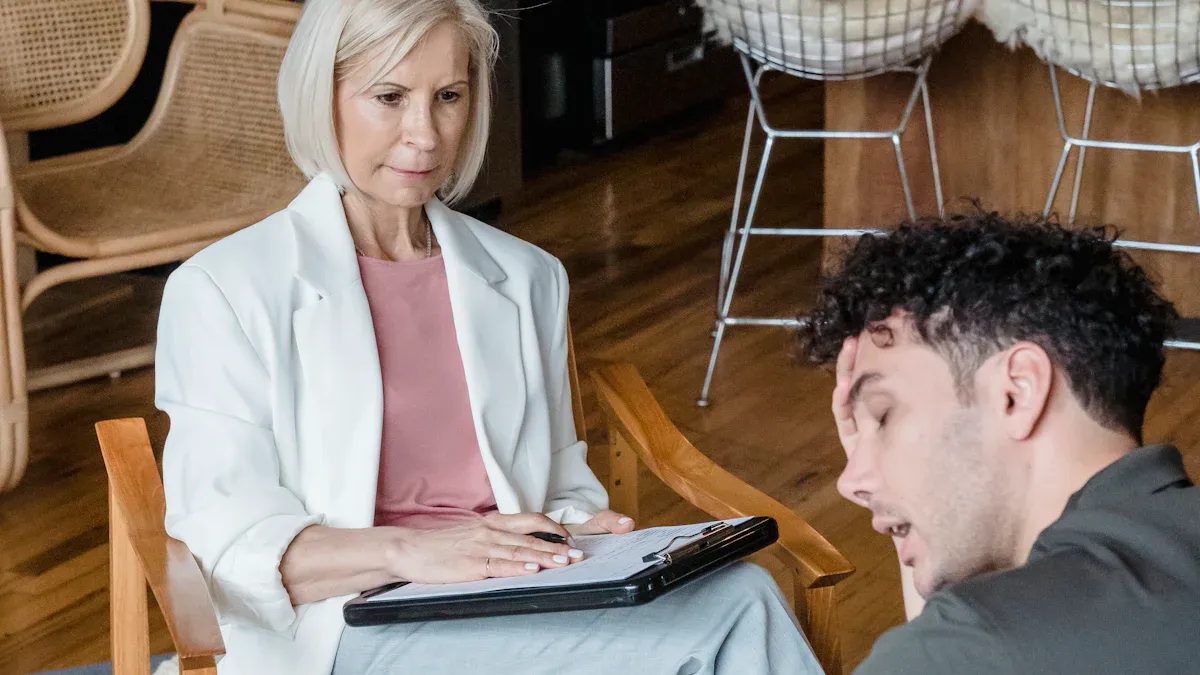
Emotional Effects
If you care for someone with cancer, you might feel like you are on an emotional roller coaster. You may notice your feelings change from day to day, or even hour to hour. Many caregivers experience:
Depression and anxiety
Emotional burden and guilt
Anger, fear, or sadness
Grief and frustration
Helplessness and fatigue
Almost half of caregivers report symptoms like anxiety, depression, or trouble sleeping. These feelings can be even stronger than what patients feel. Your age, gender, and relationship to the person with cancer can affect how you cope. The unpredictable nature of cancer can make these emotions feel even heavier.
Here’s a quick look at how common these feelings are among caregivers:
Symptom | Prevalence Range | Notes |
|---|---|---|
Anxiety | Higher in some studies | |
Depression | More common in female caregivers (57%) | |
Psychological distress | ~50% | Half of caregivers feel distressed |
Tip: You are not alone. Many caregivers feel overwhelmed. It’s okay to ask for help or talk about your feelings.
Self-Care Tips
Taking care of yourself is just as important as caring for your loved one. When you feel well, you can give better support. Here are some self-care tips that can help:
Recognize your feelings. Allow yourself to feel sad, angry, or tired.
Talk openly with friends, family, or support groups. Sharing helps lighten your load.
Accept help from others. Let people run errands or cook meals for you.
Set healthy boundaries. Say no when you need to protect your energy.
Take breaks. Short walks or quiet time can help you recharge.
Eat healthy meals and get enough sleep. Your health matters, too.
Stay organized. Use a planner to track appointments and tasks.
Plan for the future. Schedule fun activities and prepare important documents.
When you care for yourself, you help your loved one, too. Good self-care improves your mood, keeps your mind sharp, and helps you handle tough caregiving tasks. Caregivers in good health can support patients better, remember important details at doctor visits, and encourage healthy habits. If you ever feel burned out, reach out for support. You deserve care and kindness, too.
Resources
Support Groups
Support groups can make a big difference when you are coping with cancer. You might feel less alone when you talk with others who understand what you are going through. These groups come in many forms, so you can find one that fits your needs and comfort level. Some meet in person, while others connect online or by phone. Many groups are free and led by professionals like social workers or nurses, but you can also join groups run by fellow survivors.
You can choose from different types of support groups:
Professionally facilitated groups
Disease-specific groups, such as for breast or colorectal cancer
Age-specific groups for teens or young adults
Groups for caregivers and family members
Short-term or ongoing groups
Support groups offer a safe place to share your feelings, ask questions, and get advice. You might find that talking with others helps lower your stress, sadness, or anxiety. Peer support groups, where people share their own experiences, can boost your mood and help you feel more hopeful. Some people say these groups help them cope better and feel more normal during a tough time.
Here’s a quick look at some support group options:
Type of Group | What You Get |
|---|---|
Professionally facilitated | Led by experts, focus on emotional and physical coping |
Disease-specific | Connect with others facing the same type of cancer |
Specialty (caregivers, youth) | Support for unique needs of families and young people |
Online or in-person | Join from home or meet face-to-face |
Support groups can help you feel understood and give you tools to handle daily challenges.
Trusted Organizations
You do not have to search alone for help. Many trusted organizations offer support, information, and resources for people with cancer and their families. These groups can connect you with support groups, counseling, financial help, and more.
Here are some organizations you can trust:
CancerCare: Free counseling, support groups, and education for patients and families.
Cancer Support Community: Offers support, workshops, and online resources for anyone affected by cancer.
Imerman Angels: Matches you with a mentor who has faced a similar cancer journey.
Association of Oncology Social Work (AOSW): Helps you find social workers trained in cancer care.
Bag It: Gives you booklets and guides to organize your medical information.
Bone Marrow & Cancer Foundation: Offers financial help and a peer support app called CancerBuddy.
CanCare: Connects you with survivors or caregivers for one-on-one support.
Living Beyond Breast Cancer (LBBC): Provides information and community for those with breast cancer.
Sharsheret: Supports young Jewish women and families facing breast or ovarian cancer.
Family Reach: Offers financial support for families dealing with cancer.
You can also find podcasts, apps, and special programs for caregivers, young people, and veterans. Many cancer centers have social workers or psychologists who can help you find the right resources. If you need support, these organizations are ready to help you every step of the way.
You might feel a mix of sadness, fear, or anger after a cancer diagnosis. Letting yourself feel and talk about these emotions helps you heal and adjust. Support from friends, family, and professionals can make a big difference. Coping strategies like journaling, gentle exercise, and staying hopeful help you build resilience and improve your well-being.
Remember, you are not alone. Reaching out for help is a sign of strength, and brighter days can lie ahead. 🌟
FAQ
What should I do if I feel overwhelmed after my diagnosis?
You can take a deep breath and give yourself time. Try talking to someone you trust. Writing in a journal or joining a support group can help. Remember, you do not have to handle everything alone.
How can I support a friend or family member with cancer?
Listen to them. Offer help with daily tasks, like meals or rides. Sometimes, just being there means a lot. Ask what they need and respect their wishes. A simple message or card can brighten their day. 💌
Is it normal to feel angry or sad about cancer?
Yes, it is very normal. You might feel sad, angry, or even scared. These feelings come and go. Let yourself feel them. If you need extra help, talk to a counselor or join a support group.
Where can I find more help or information?
You can reach out to trusted groups like CancerCare or the American Cancer Society. Many hospitals have social workers who can guide you. Online forums and local support groups also offer advice and comfort.
See Also
Recognizing The Signs And Symptoms Of Male Breast Cancer
Understanding Cervical Cancer And Identifying Its Key Symptoms
Essential Information On Symptoms Of Adrenocortical Carcinoma

